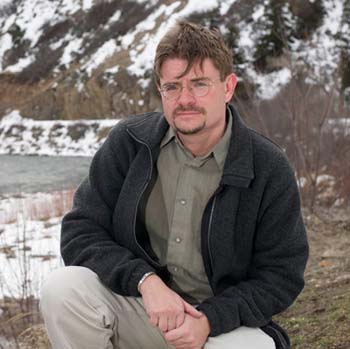
Rifle, Colo. resident Alan Lambert says he looks for balance in choosing a candidate. David Frey photo.
Rep. John Salazar was once a shoo-in for his seat in Congress. But now the moderate Colorado Democrat is running neck-and-neck with Republican Scott Tipton, whose Tea Party support has made him a contender.
Cowboy hats are a common sight in Rifle, Colorado. Gas industry caps may be even more common. It’s a rugged Western town with a heritage of ranching and a recent boom – and bust – of natural gas drilling, a place where politics tend rightward, but voters boast a common-sense approach.
Voters here, and across Western Colorado, will play a key role in deciding the balance of Congress. Among 112 House seats in play across the country, Colorado’s third Congressional district is one of just 37 considered a tossup. Only three others – Arizona’s first, New Mexico’s second and Nevada’s third districts – are in the West.
In past years, the incumbent here, Rep. John Salazar, was a shoe-in. A potato seed farmer from the tiny town of Manassa in the impoverished San Luis Valley, Salazar, a moderate Democrat, reflected the rural nature of this sprawling district. But it’s a different political climate this time around, and a different economic climate. That’s obvious here, where oil and gas jobs and construction work have disappeared and Salazar is struggling to hold onto his seat.
“I liked his views at one time,” said Karl Wailes, a resident of nearby New Castle who works as a heavy diesel mechanic for the energy industry. “It seemed like he was more on our side at one time. Now it seems he forgot about the small people.”
Four years ago when Scott Tipton, of Cortez, who runs a trading post and pottery business near Mesa Verde National Park, ran as a Republican, Salazar trampled him. This year, the two are running neck and neck in a vicious campaign of name-calling and personal attacks that has drawn millions of dollars of outside money.
Wailes, an unaffiliated voter, said he voted for Salazar in the past, but not this time. He’s not voting for Tipton, either, though. Neither his friend Kirk Charlesworth, of Loma.
“I’ll vote blank,” said Charlesworth, a Republican and fellow gas worker, who joined Wailes for burgers and burritos at the Base Camp Café, a popular hangout for gas workers, while on break from an environmental training session. Salazar has been too liberal, Charlesworth said, especially in his support of wilderness and oil and gas restrictions. Tipton may be too extreme in the other direction, though, he said.
“They’re all a bunch of lying sons of bitches,” Wailes said.
About the size of New York state, Colorado’s third Congressional district stretches from the arid Eastern Plains across southern Colorado, spans the Continental Divide and spreads across the deserts of the Western Slope. It’s a district mostly of farmers, ranchers and small towns.
Colorado has become the biggest target of outside campaign money in the country. Bloomberg reports that independent groups have poured $9.4 million into campaigns here between Sept. 1 and Oct. 12, more than in any other state. Eighty percent of that went to Republicans, led by GOP strategist Karl Rove’s groups American Crossroads and Crossroads GPS.
In addition to Congressional races at play, Colorado’s Senate race is one of just eight considered a tossup, with Sen. Michael Bennet, a Democrat, locked in a dead heat with Republican Ken Buck. Michelle Obama and Bill Clinton have come to stump for Bennet.
Karl Rove held an Aspen fund-raiser with ticket prices starting at $75 to benefit Tipton and other candidates.
“We do have a very clear choice in this election,” said Tipton, a state representative. “John Salazar is standing for bigger government, higher taxes and more regulation.”
Tipton beat a Tea Party favorite who had Sarah Palin’s endorsement in a primary battle to win his party’s nomination. He’s since won over the Tea Party crowd, and Palin, with a campaign calling for smaller government and linking Salazar to Obama and House Speaker Nancy Pelosi.
Tipton criticizes Salazar for voting for health care reform and for the stimulus package, and for voting with Pelosi 97 percent of the time.
“He lined up with the Obama agenda, the Pelosi agenda, the liberal agenda,” he said. “They know they have his vote when they need it.”
Salazar has sought to distance himself from his fellow Democrats. Even Rep. John Boehner, the leading Republican in the House, votes with Pelosi 88 percent of the time, Salazar said. On more critical legislation, a National Journal review found Salazar, a member of the fiscally-conservative Blue Dog Democrats, voted with his party 57.7 percent of the time, making him one of the more moderate members of Congress.
“I’ve always been an independent voice,” said Salazar, who touts voting against the bank bailout and cap-and-trade legislation.
“In this political climate, I could walk on water and still be criticized,” he said.
Colorado’s third district is home to some of Colorado’s poorest counties, where aging farm towns have withered, and resort towns like Aspen and Telluride that are playgrounds for some of the wealthiest people in the world. It’s home to the Western Slope Conservative Alliance, Colorado’s largest coalition of Tea Party groups, which has endorsed Tipton, and union-heavy factories in Pueblo, where Salazar had a vocal audience of supporters at a recent debate.
Led by Nevada, the West has the highest unemployment rate in the country, at 11.5 percent in August. Colorado, with an unemployment rate of 8.2 percent, lost 28,000 jobs since August 2009. The third Congressional district has the highest unemployment rates in the state, topping out at 14.5 percent in rural Dolores County in southwestern Colorado.
“Frankly, the economy is in a ditch now and they’re complaining about the size of the tow truck,” Salazar said.
He defends his record and takes aim at Tipton for backing away from more extreme statements he made before the primary in which he called for cutting the federal government in half and abolishing the Education Department.
Tipton has since backed what he calls the “three tens.” He wants to slash non-military government spending by 10 percent and set capital gains taxes and the corporate tax rate at a flat 10 percent.
“Washington has been building and growing on the backs of the American people,” he said. “Washington is the only place in the country, maybe in the world, that hasn’t experienced a recession.”
Groups like the conservative Eagle Forum and industry groups representing bankers, builders and energy companies are rallying behind Tipton. Liberal groups like America’s Families First Action Fund and Majority Action have lined up behind Salazar.
The result has been blistering attacks on the two candidates and on the eardrums of TV viewers subjected to a barrage of negative campaign ads against “No-Show Salazar,” a nickname for failing to hold town hall meetings, and “Two-Way Tipton,” for his appearance of backing away from more controversial views.
“I always look for balance,” said Alan Lambert, a woodworker and Rifle city councilman, taking his turn at the counter at Midland Art Co., a co-op of local artisans in downtown Rifle. A registered Republican, Lambert boasts a middle-of-the-road approach. He is campaigning for a local Democratic candidate. He said he hasn’t made up his mind on the Congressional race.
“I like the fact that Salazar’s been a rancher and knows the needs of the small-town ranching community,” Lambert said. “Tipton’s got good business sense.”
As a member of the National Rifle Association, Lambert said he was pleased to see Salazar win its endorsement.
“We need to have a little balance in Congress so things can get done,” he said. “I look for that more in a candidate now. Can they bring more level-headedness to the legislature?”


